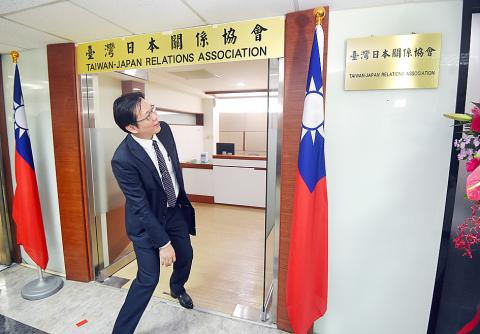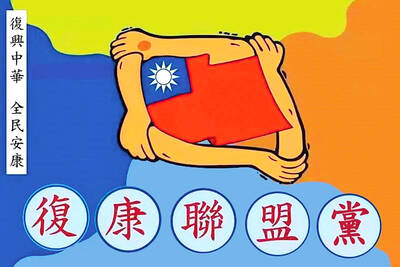Renaming Japan’s representative office in Taipei as the Taiwan-Japan Relations Association would help lessen misunderstandings and reflect Taiwan’s burgeoning relationship with Japan, association president Chiou I-jen (邱義仁) said yesterday at the official unveiling of the association’s new doorplate in Taipei.
“While people were clear about what we were concerned with when the office was first established, as time has gone by, many no longer have a clue,” Chiou said, recalling how he once received a telephone call asking him to resolve an issue in Hawaii.
“Finally” changing the name of the non-governmental agency, formerly known as the Association of East Asian Relations, Taiwan, after almost 45 years lends clarity to the association’s mission, he said.

Photo: Liao Chen-huei, Taipei Times
The association was established in 1972 to handle relations with Japan after diplomatic ties were broken off, with its Tokyo branch — the Taipei Economic and Cultural Representative Office in Japan — also serving as Taiwan’s de facto embassy in the nation.
While officially a civic organization under government contract, most employees simultaneously hold positions at the Ministry of Foreign Affairs.
The name change follows a similar change on the part of its Japanese counterpart earlier this year, which changed its name from Interchange Association, Japan to the Japan-Taiwan Exchange Association.
“Before we changed our name, a lot of people were not clear about our mission — we even had people calling and asking us about marriage matches,” Japan-Taiwan Exchange Association Representative Mikio Numata said, adding that the renaming is a “historic step,” as its name now conforms with reality.
“The name changes not only help the outside world understand the substantial content of both associations’ work — it also verifies the continued positive development of Taiwan-Japanese relations,” Minister of Foreign Affairs David Lee (李大維) said.
Relations have “never been better or more intimate,” he said, citing record-high bilateral trade and tourism.
Any discussion of renaming the Coordination Council for North American Affairs — which handles relations with the US — would have to wait until US President Donald Trump fills key Department of State vacancies, he said.
The ministry’s Japanese Political Affairs director, Fu Kuo-hua (傅國華), said the name changes primarily reflected a shift in Taiwan’s stance.
Japan had proposed using “Taiwan-Japan” to name the associations when official diplomatic ties were first broken off, but the proposal was rejected by Chiang Kai-shek’s (蔣介石) administration, which wanted to use “Chinese-Japanese,” he said.
China yesterday called the name change a “conspiracy” and urged Japan not to send “false signals” to Taiwan and the international community.
“We strongly object to this attempt to upgrade Japanese-Taiwanese relations,” Chinese Ministry of Foreign Affairs spokeswoman Hua Chunying (華春瑩) said. “We urge the Japanese government to scrupulously abide by the principles of the Japan-China Joint Communique, as well as all the promises which Japan has made to China to the present, including holding firm to the ‘one China’ principle.”
“The Japanese government should take concrete action to correct wrong methods and should not send false signals to Taiwan’s government and the international community, creating new interference for Sino-Japanese relations,” she said. “We also want to tell the Taiwanese government that any attempt to create ‘two Chinas’ or ‘one China, one Taiwan’ is doomed to failure.”
Additional reporting by CNA

AIR DEFENSE: The Norwegian missile system has proved highly effective in Ukraine in its war against Russia, and the US has recommended it for Taiwan, an expert said The Norwegian Advanced Surface-to-Air Missile Systems (NASAMS) Taiwan ordered from the US would be installed in strategically important positions in Taipei and New Taipei City to guard the region, the Ministry of National Defense said in statement yesterday. The air defense system would be deployed in Taipei’s Songshan District (松山) and New Taipei City’s Tamsui District (淡水), the ministry said, adding that the systems could be delivered as soon as the end of this year. The US Defense Security Cooperation Agency has previously said that three NASAMS would be sold to Taiwan. The weapons are part of the 17th US arms sale to

SERIOUS ALLEGATIONS: The suspects formed spy networks and paramilitary groups to kill government officials during a possible Chinese invasion, prosecutors said Prosecutors have indicted seven retired military officers, members of the Rehabilitation Alliance Party, for allegedly obtaining funds from China, and forming paramilitary groups and assassination squads in Taiwan to collaborate with Chinese troops in a possible war. The suspects contravened the National Security Act (國家安全法) by taking photos and drawing maps of key radar stations, missile installations and the American Institute in Taiwan’s headquarters in Taipei, prosecutors said. They allegedly prepared to collaborate with China during a possible invasion of Taiwan, prosecutors said. Retired military officer Chu Hung-i (屈宏義), 62, a Republic of China Army Academy graduate, went to China

INSURRECTION: The NSB said it found evidence the CCP was seeking snipers in Taiwan to target members of the military and foreign organizations in the event of an invasion The number of Chinese spies prosecuted in Taiwan has grown threefold over a four-year period, the National Security Bureau (NSB) said in a report released yesterday. In 2021 and 2022, 16 and 10 spies were prosecuted respectively, but that number grew to 64 last year, it said, adding that the Chinese Communist Party (CCP) was working with gangs in Taiwan to develop a network of armed spies. Spies in Taiwan have on behalf of the CCP used a variety of channels and methods to infiltrate all sectors of the country, and recruited Taiwanese to cooperate in developing organizations and obtaining sensitive information

BREAKTHROUGH: The US is making chips on par in yield and quality with Taiwan, despite people saying that it could not happen, the official said Taiwan Semiconductor Manufacturing Co (TSMC, 台積電) has begun producing advanced 4-nanometer (nm) chips for US customers in Arizona, US Secretary of Commerce Gina Raimondo said, a milestone in the semiconductor efforts of the administration of US President Joe Biden. In November last year, the commerce department finalized a US$6.6 billion grant to TSMC’s US unit for semiconductor production in Phoenix, Arizona. “For the first time ever in our country’s history, we are making leading edge 4-nanometer chips on American soil, American workers — on par in yield and quality with Taiwan,” Raimondo said, adding that production had begun in recent